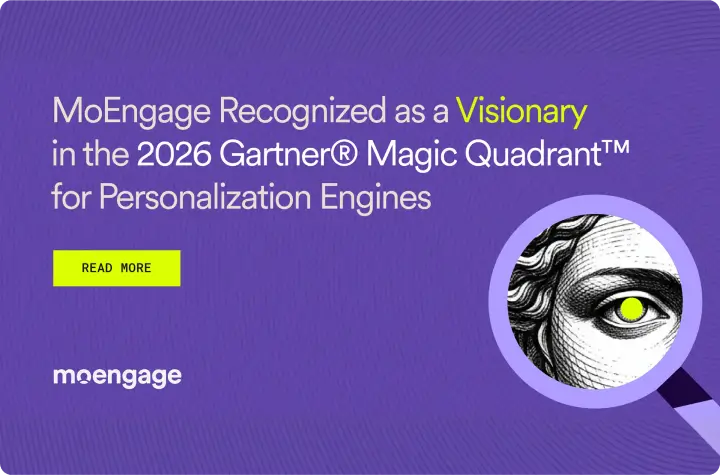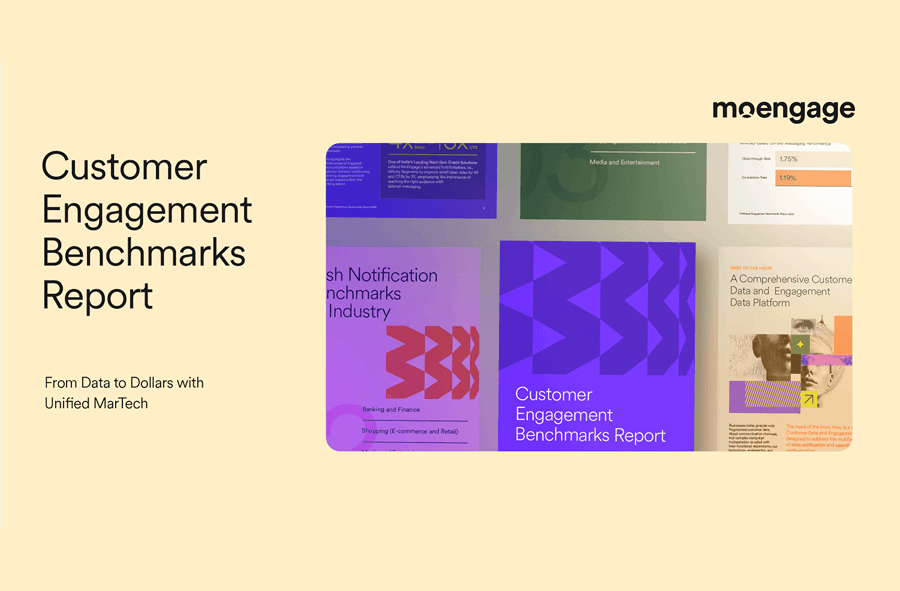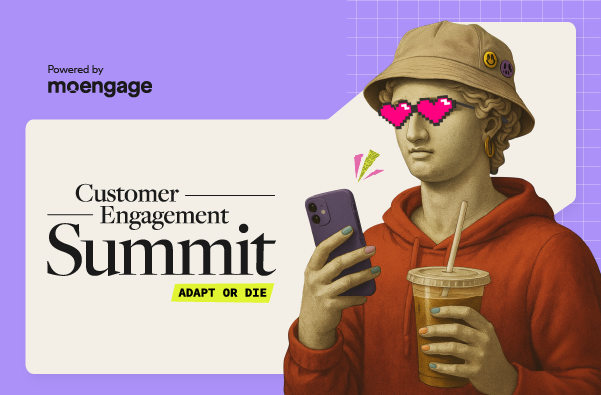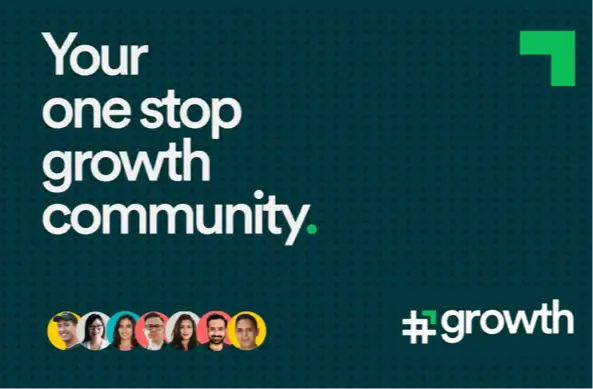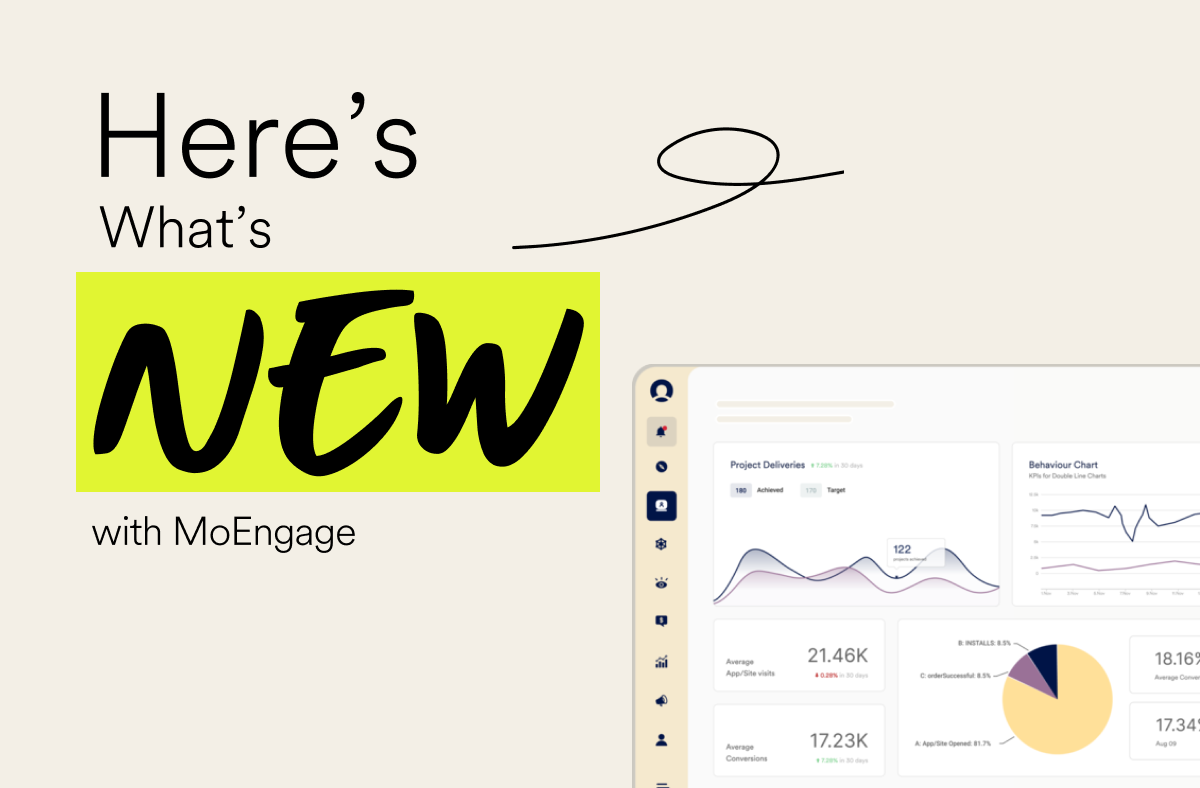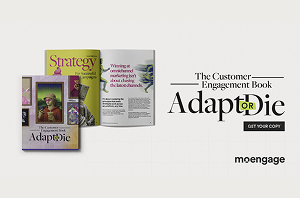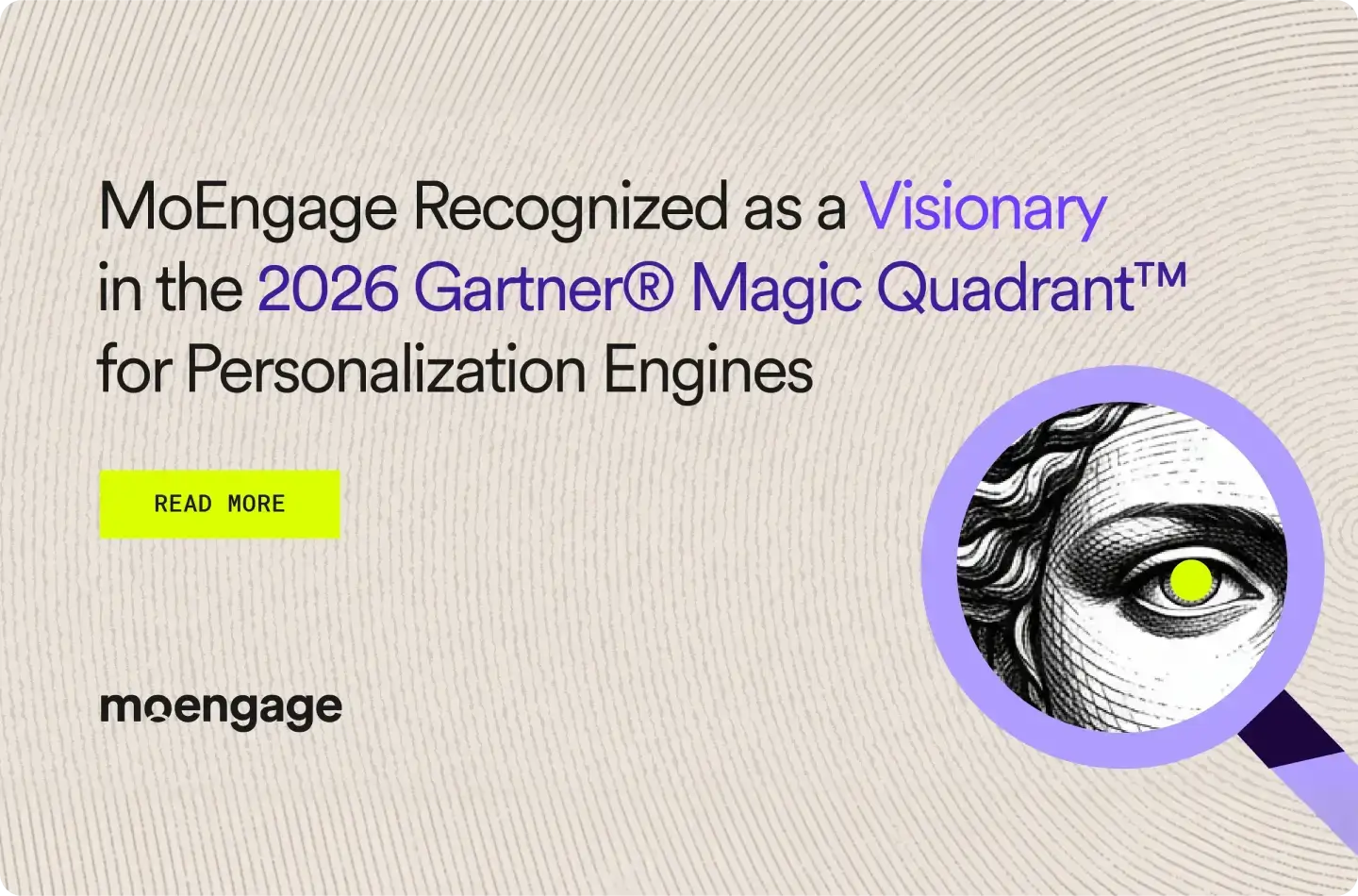15 Best Iterable Competitors: How to Choose the Right One
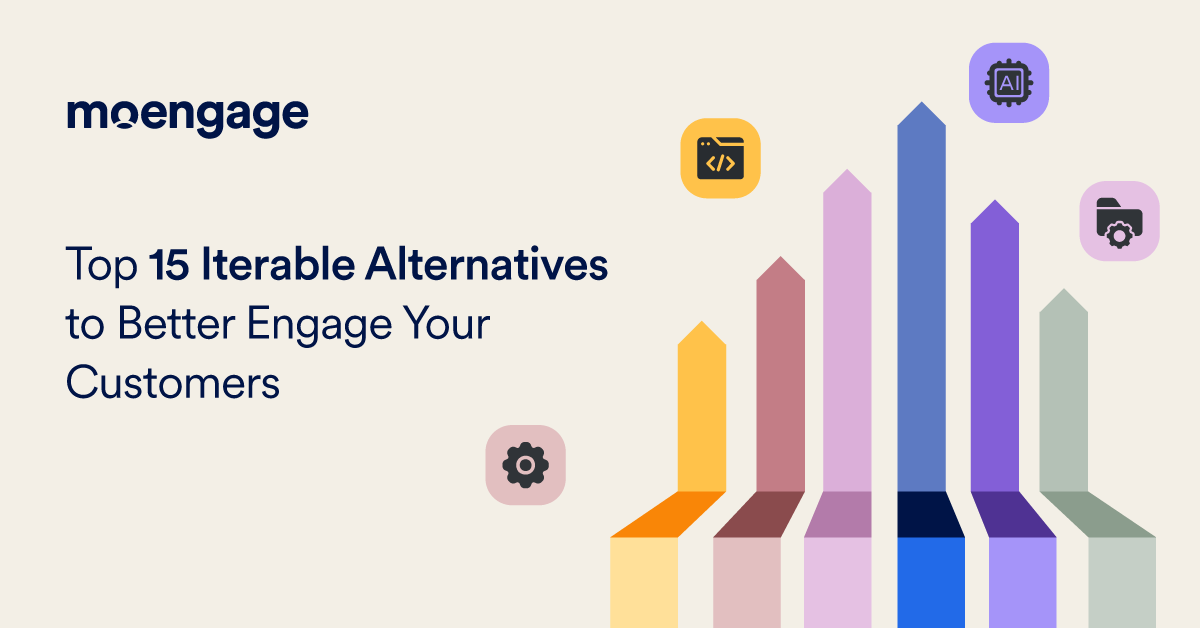
Considering a switch from Iterable? Or perhaps you’re just exploring Iterable competitors because you’ve heard whispers about its clunky reporting and analytics and rigid pricing?
You’ve come to the right place.
Known for being email-first, Iterable works well if you prioritize automated email marketing campaigns. But if omnichannel messaging and advanced analytics are also on your radar, then there are Iterable alternatives that can do the job significantly better.
Choosing the right customer engagement platform can feel anything but ‘easy as ABC’ – we’re sure you’d agree. Unfortunately, selecting the right Iterable alternative means sifting through features, channel capabilities, and pricing models to find the one that fits your marketing team like a glove.
This guide walks you through the top Iterable alternatives, key factors to consider, and essential migration strategies for a seamless transition. Let’s dive in!
15 Best Iterable Competitors for Customer Engagement
To make your job easier, here’s a comprehensive list of 15 Iterable competitors and alternatives, from mobile marketing automation software to omnichannel marketing platforms. You’ll discover not just who these platforms are, but why they stand out against Iterable. Your needs, specific use case, and budget will guide you in choosing the right option.
1. Best for AI-driven cross-channel customer experiences: MoEngage
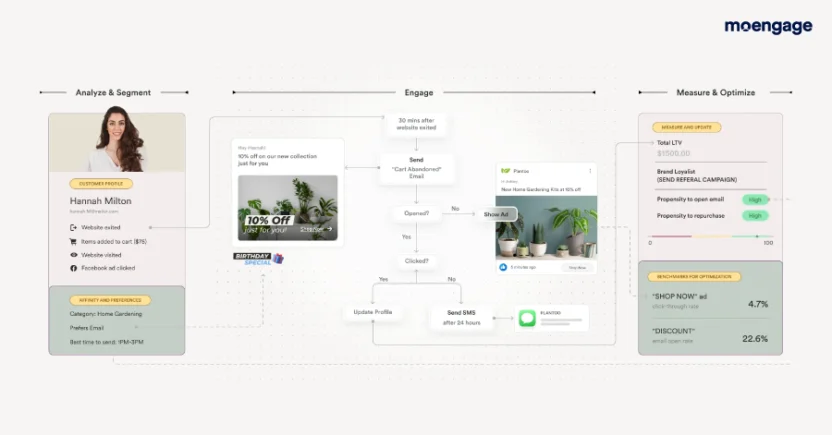
MoEngage is a cross-channel customer engagement platform (CEP) built for brands that want to connect with customers across all the channels they love. With its AI features, you can predict customer behavior, automate personalization, and drive higher engagement.
Cost: MoEngage’s pricing is based on Monthly Tracked Users (MTU), covering only engaged users (contacts). The platform is free for the first 10K active contacts.
G2 Rating: 4.5/5
Channels: Email, SMS, RCS, mobile and web push notifications, in-app messaging, on-site messaging, WhatsApp, web personalization, Facebook Audience, and Google Ads Audience.
Standout Feature: Predictive analytics backed by AI, without any external tools.
Why It’s Best for AI-Driven Cross-Channel Customer Experiences: MoEngage provides superior channel flexibility, robust analytics, and predictive AI tools that can drive the results you need.
What MoEngage has that Iterable Doesn’t:
We sourced all of this information directly from Iterable’s website, with references, and it is accurate as of November 2025:
A) Better omnichannel performance
Although Iterable allows you to engage with customers across multiple channels, it excels primarily in email. In fact, it has strong capabilities with Email Service Providers (ESPs) and Mail Transfer Authorities (MTAs). Other communication channels, like SMS and push notifications, aren’t its strong suit. For instance, some Iterable customers have even reported difficulties implementing and managing SMS marketing.
Some of the Iterable competitors on this list are also designed only for specific channels, like email, SMS, or push notifications.
But MoEngage has the upper hand. It’s designed for marketing automation across a whopping 10+ channels — not just email, but push notifications, SMS and RCS, in-app messaging, WhatsApp, on-site messaging, Facebook Ads, and more.
What’s more, MoEngage shares channel performance dashboards, where you can see which channels perform best in terms of impressions, conversions, revenue, and other metrics.
How does any of that matter to you? Well, with MoEngage’s Most Preferred Channel and Best Time to Send features, you can reach your customers on the channel they’re most likely to engage with you on at the optimal hour, depending on their past interactions with your brand. It wouldn’t do to send emails to customers who typically respond to in-app messages, would it? Or being on fewer channels than your customers?
After all, the more customer-preferred channels you use, the more unified your customer experiences will be across all channels.
For example, Beem, a San Francisco-based AI fintech startup, noticed their customer data was fragmented due to having multiple channel providers. So, they wanted to unify their customer profiles. But that wasn’t possible in Iterable.
Beem couldn’t even send highly personalized messages to different customer segments at scale. Moving to Iterable itself had taken them over 3 months, and that too, without much support. It may be due to the fact that Iterable relies heavily on partners, rather than Iterable employees, to complete onboarding.
To modernize their workflows, Beem successfully switched from Iterable to MoEngage in just 50 days. The migration process was smooth, thanks to transparent timelines, a clear proof-of-concept (POC), and thorough product training.
The result? MoEngage helped Beem unify their customer profiles from multiple touchpoints into a single system, improving the customer engagement experience. They achieved a 90% SMS delivery rate and 34% average email open rates.
And as if that weren’t enough, Iterable often requires extra development work. For example, it doesn’t support a functional Flutter SDK. That’s a real bummer for app-centric brands, as their teams would then have to code separately for Android and iOS.
With MoEngage’s Flutter SDK, your dev team can save time by using just one piece of code to deploy campaigns across devices.
B) Advanced AI-driven predictive analytics
Iterable’s customers rarely use its AI features. That may be because the features, like predictive audiences, are pricey, dated, and limited in performance.
In comparison, MoEngage’s predictive AI tools simplify data-driven actions, so you can outperform your competitors. Specifically, MoEngage’s Merlin AI suggests and generates the best-performing email subject lines, offers, and images for each customer. Its predicted churn models can also identify at-risk customers and build targeted campaigns to retain them.
Furthermore, Merlin AI Jinja Assist generates personalized Jinja code blocks that you can use to add dynamic product recommendations or shipping updates to your campaigns. You just need to provide simple natural language prompts, and your job’s done.
Also, Iterable expects marketers to customize their own recommendation engines. But thankfully, MoEngage already provides out-of-the-box, personalized product recommendations.
C) Robust reporting and campaign analytics
Reporting isn’t among Iterable’s strongest points. At all. Many users complain about its limited reporting views and the need for external tools like Google Analytics to analyze performance.
MoEngage changes the game with custom dashboards. These dashboards help you monitor and analyze campaigns in real-time, including customer behavior trends, audience growth, and revenue generated over time. Plus, with its automated reports, you can share performance updates instantly with stakeholders — they don’t even need to log in to MoEngage.
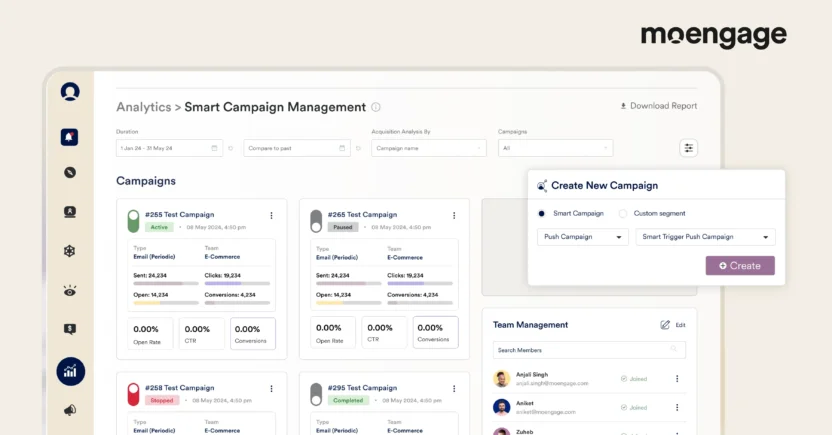
Consider Fastic, the world’s largest health and fitness app with over 50 million downloads, which successfully migrated 100 campaigns from Iterable to MoEngage in a mere three weeks. Apart from Iterable’s analytics reporting issue, they had been facing a lack of support from Iterable’s team whenever they wanted to implement custom use cases.
After the move, they were able to have a 360-degree view of their customers in MoEngage’s reporting dashboard, leading to re-engagement strategies with better personalization. As a result, 35% of their re-engaged customers subscribed to their app. They also saved 1-2 hours in compiling reports.
D) Platform stability
Downtime is incredibly frustrating. Imagine it impacting your critical Black Friday campaigns: you can pretty much kiss revenue goodbye. Iterable customers complain about bugs and service interruptions that might disrupt their operations. They also mention slow performance for complex automated workflows.
Meanwhile, MoEngage offers more uptime reliability. Even during peak traffic, you can rest assured that the platform will perform consistently. That’s because it’s engineered for stability during high-stakes campaigns, ensuring a 99.9% uptime history. Translation: fewer incidents.
Now you know how MoEngage compares against Iterable. Let’s examine the remaining Iterable alternatives and competitors.
2. Best for simple campaigns: ActiveCampaign
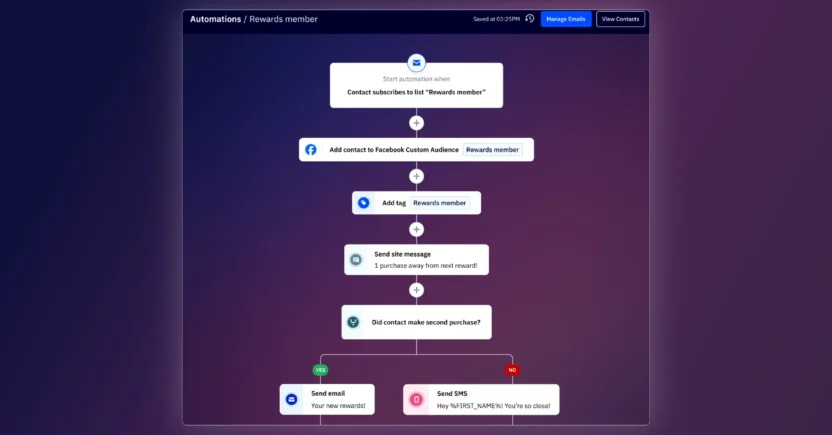
One of the easiest-to-use Iterable competitors, ActiveCampaign is a marketing automation and CRM platform. It helps you build dynamic and shareable marketing dashboards to monitor campaign performance. With those insights, you can target the right contacts with the right campaigns.
Unlike some other marketing automation platforms, such as Iterable, which can feel clunky or have formatting issues, the automations on ActiveCampaign work smoothly and are relatively straightforward to set up. Managing email lists and sending campaigns in compliance with GDPR gets easier with this platform. You can also build and design forms and landing pages.
But there’s a catch. ActiveCampaign lets you build cross-channel campaigns across just four channels: email, WhatsApp, web, and SMS. For more advanced functionality, it needs to be integrated with other apps, such as BulkSMS (for global two-way SMS), Facebook Messenger (to answer customer questions), Zoho Analytics (for attribution tracking), and Jotform (for lead generation forms).
Using so many different tools at once on a platform can get overwhelming soon enough, though. A few customers have also noted lags with large contact lists or heavier automations, interrupting their workflows.
Cost: It depends on the channel and the pricing tier you choose, and rises with the number of contacts. For example, pricing ranges from $15/month to $145/month for 1K email contacts. For 50K email contacts, it charges between $609 and $1,169 per month, with the higher pricing tier giving you access to more advanced features. Similarly, you need to pay between $319/month and $706/month for 5K WhatsApp contacts.
G2 Rating: 4.5/5
Channels: Email, WhatsApp, website, and SMS.
Standout Feature: Goal-aware AI agents to build automated marketing campaigns from simple conversations.
Why It’s Best for Simple Campaigns: From split and conditional actions to predictive sending optimization and advanced segmentation, ActiveCampaign can set up simple automation campaigns. However, setting up advanced reporting is challenging, and its sluggish performance makes sending complex campaigns difficult.
3. Best for CRM integrations: Adobe Marketo Engage
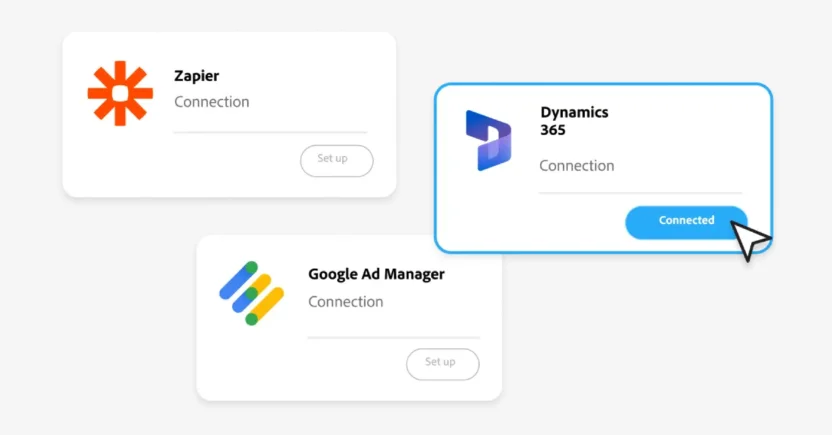
Adobe Marketo Engage competes with Iterable because it streamlines lead nurturing and marketing automation by integrating with sales software. Since it helps B2C lifecycle marketers boost sales performance and generate sales-ready leads, its CRM integrations are quite useful.
But basic tasks like asset management or reporting can sometimes take longer than expected. Add to that its clunky interface and the steep learning curve for new users, and Marketo Engage seems too expensive to be facing such fundamental issues.
Thankfully, there are several alternatives to Adobe Marketo Engage you can consider when evaluating CEPs.
Cost: It grows with the size of your contact database, offering four pricing tiers. Monthly pricing starts at around $1K, with access to audience segmentation, campaign reporting, and other core features. You’d need to pay more for access to more advanced features like advanced journey analytics. Channels like mobile push, SMS, and web personalization are also offered as add-ons.
G2 Rating: 4.1/5
Channels: Email, web, SMS, mobile push notifications, social channels (Facebook, X, and LinkedIn), Adobe Dynamic Chat, display ads, and webinars.
Standout Feature: Creating targeted and personalized ad campaigns by matching account-based audiences from Marketo Engage.
Why It’s Best for CRM Integrations: Marketo Engage integrates smoothly with large CRMs, such as Salesforce, delivering better results than otherwise.
4. Best for mobile customer engagement: Pushwoosh
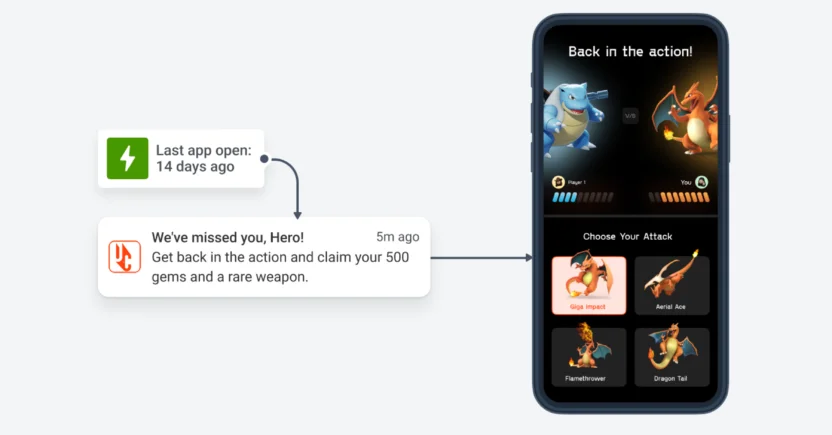
Don’t let the platform’s name mislead you! Pushwoosh helps you automate not only web and mobile push notifications, but also emails, text messages, in-app, and WhatsApp messages.
Compared to Iterable, Pushwoosh is quite affordable and easy to use. This platform simplifies setting up highly targeted marketing campaigns due to its personalization, rich media, and real-time messaging capabilities.
Some of its users have praised the platform’s exceptional delivery speed of push notifications. They’ve also lauded the support team’s prompt and professional responses to any support tickets raised.
On the other hand, Pushwoosh supports only two integrations: Shopify and Segment. So, it wouldn’t be an ideal choice among Iterable competitors if yours is an enterprise hospitality brand, for instance.
Cost: It grows with the number of channels and subscribers. Its Base plan is free for unlimited campaigns and platform features, but only up to 1K push subscribers. For push notifications, pricing starts at $1/ month for 1,200 subscribers and goes up to $897/month for 300K subscribers. As for email campaigns, the pricing depends on the number of monthly email campaigns and the number of recipients. For instance, sending 5 campaigns a month to 100K recipients would cost $499/month.
G2 Rating: 4.4/5
Channels: Push notifications, email, SMS, WhatsApp, and in-app messaging.
Standout Feature: Optimal time to send push notifications to customers based on their past actions.
Why It’s Best for Mobile Customer Engagement: Pushwoosh started as a mobile push notification service. Its focus on mobile enabled it to efficiently combine mobile marketing channels, like in-app messaging and SMS, to engage with customers.
5. Best for SMS analytics: Textedly
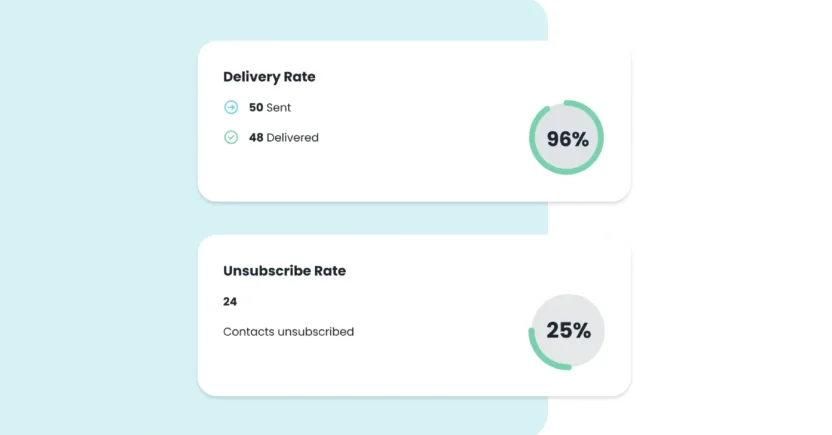
When it comes to SMS and MMS marketing automation, Textedly beats Iterable hands down. It helps you send automated one-time, drip, or recurring text message sequences within fixed delivery windows to match recipients’ time zones. From using pre-built SMS templates to monitoring SMS engagement metrics, you can make your SMS messages more relevant for your customers with Textedly.
Setting up the platform for your team is super easy. Even more so, as their support team responds quickly to any doubts. The interface is easy to use and navigate, too.
Where the platform lags behind is its contact segmentation capability — you can’t segment your audience for sending tailored SMS messages. Some users have also mentioned that there was a gap between what was promised and what was delivered. Particularly, the setup timeframes were miscommunicated.
Textedly doesn’t let you track SMS clickthrough rates natively, either. To do that, you need to use unique links with UTM parameters.
Cost: Grows with the number of text messages you send per month. With 16 pricing plans, Textedly makes it easy for you to select the plan that works best for your team. Its Free plan lets you send just 50 text messages, while its Basic plan, 600 monthly text messages for $29/month, billed annually. For 240K monthly text messages, you can choose the Champion plan (the highest pricing tier) that costs $3599/month, billed annually. If you need to send more, you can call their team for custom pricing.
G2 Rating: 4.6/5
Channels: SMS and MMS
Standout Feature: Two-way SMS to let your subscribers reply to your text messages in one-on-one chats.
Why It’s Best for SMS Analytics: From the number of SMS messages sent and received to delivery rates and unsubscribe rates, Textedly gives you a bird’s-eye view of how your messages are performing. Its Activities Report automatically breaks down the day-to-day analysis of all messages and contact opt-ins.
6. Best for API integration: Twilio SendGrid
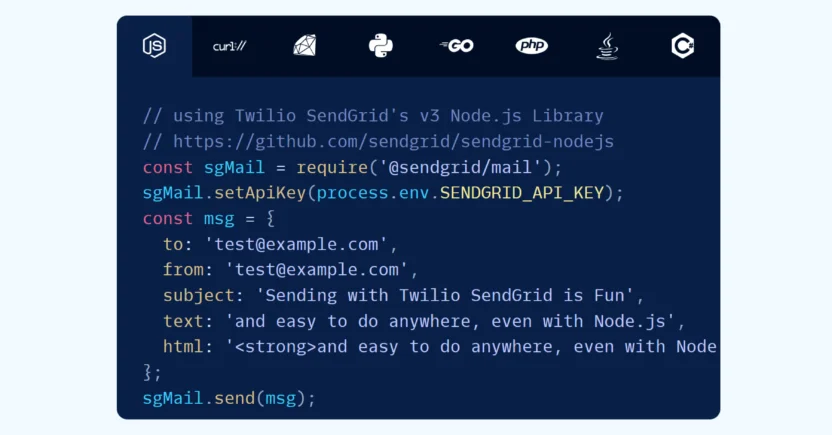
With powerful email APIs and SMTP service, you can count Twilio SendGrid among capable Iterable competitors. You can send bulk emails at once using its easy-to-use email marketing tools. Apart from its reliable email deliverability, it’s also known for having straightforward API keys to easily integrate with your existing software.
A more extended knowledge base with a detailed integration guide, however, might help B2C marketers who aren’t well-versed with tech. But honestly, it’s not designed for such marketers.
Cost: SendGrid offers a two-month free trial, during which you can send 100 emails a day. Then, its Essentials plan starts at $19.95/month for up to 100K monthly emails. But that doesn’t offer dedicated IP addresses, single sign-on (SSO), or IP warm-ups. You’ll get these features under its Pro plan, where you can pay from $89.95/month for sending up to 2.5M monthly emails.
G2 Rating: 4/5
Channels: APIs for email, SMS, WhatsApp, and MMS.
Standout Feature: Link Shortening to automatically detect and shorten long URLs at the message send request’s run time. The shortened URL includes the brand’s name.
Why it’s Best for API Integration: Creating an account and obtaining an API key is a straightforward process.
7. Best for advanced data management: Salesforce Marketing Cloud
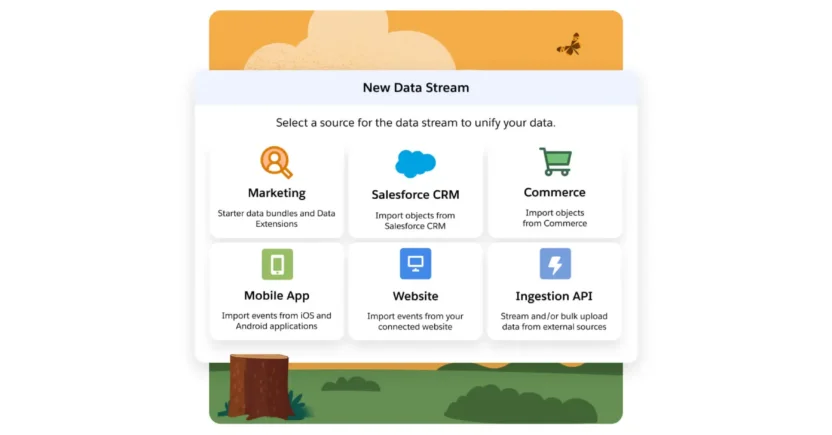
Salesforce Marketing Cloud is, in their own words, an ‘agentic marketing platform’. Thanks to its deep integration with Salesforce CRM, you can get holistic customer profiles through a seamless data sync. This is why, compared to Iterable, it’s better suited for large enterprises that want to automate large-scale marketing campaigns.
But many users have remarked how difficult the platform is to navigate. And as it’s split into several modules, having to complete a certification for each module just to even begin learning the ropes can be daunting. The learning curve is as steep as it gets.
Such challenges make Salesforce users search for Salesforce Marketing Cloud competitors to evaluate and switch to.
Cost: The platform offers a three-tier pricing plan. Its Starter Suite costs $25/month for each user, providing dynamic email marketing and analytics, built-in sales flows, and connected Slack conversations. To access forms, landing pages, and multi-channel journeys, you can subscribe to the Marketing Cloud Growth Edition for $1,500/month. Under its Marketing Cloud Advanced plan, you can access AI scoring, path experimentation, and unified conversational SMS for $3,250/month.
G2 Rating: 4/5
Channels: Email, SMS, mobile push notifications, WhatsApp, social media, and ads
Standout Feature: Paid media optimization that autonomously pauses underperforming ads and suggests how to improve them.
Why It’s Best for Advanced Data Management: Salesforce unifies all structured and unstructured data in Data Cloud (for Snowflake, Google, AWS, and Databricks) to build up-to-date data-driven customer journeys while keeping the data secure.
8. Best for marketing and sales integration: HubSpot Marketing Hub
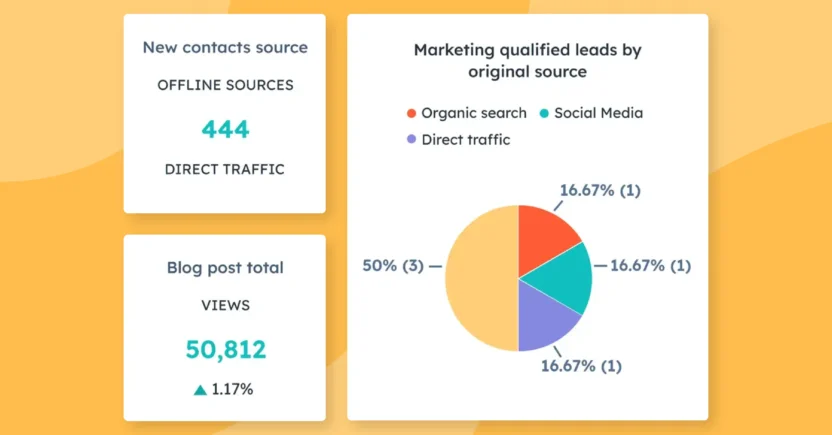
Delivering a personalized experience at scale to convert the right customers, HubSpot helps you save time. Another advantage of using it as one of the Iterable competitors and alternatives is that it’s a part of the HubSpot CRM platform. This means you can keep customer data at the center of your marketing automation efforts.
That said, having different databases for different purposes on one single platform can get overwhelming before you know it. Smaller teams have asked for better and simpler onboarding support, highlighting the steep learning curve for beginners.
Cost: Monthly pricing starts at $890 for 2K marketing contacts, 3 users, and 5K campaigns per account. You have to pay $50 for every additional user under this plan, and $3K as a one-time onboarding fee. For enterprise teams, HubSpot Marketing Hub costs $3.6K per month for 10K marketing contacts and 5 users, with $75 per additional user. This cost excludes the one-time enterprise onboarding fee of $7K.
G2 Rating: 4.5/5
Channels: SMS, email, and social media. You can integrate HubSpot with OneSignal for push notifications. WhatsApp integration is available, too.
Standout Feature: Lookalike Lists to target customers who mirror warm prospects from among your contacts.
Why It’s Best for Marketing and Sales Integration: Since HubSpot Marketing Hub is part of its CRM platform, you can align its data with sales to prove ROI.
9. Best for automated push notifications: OneSignal
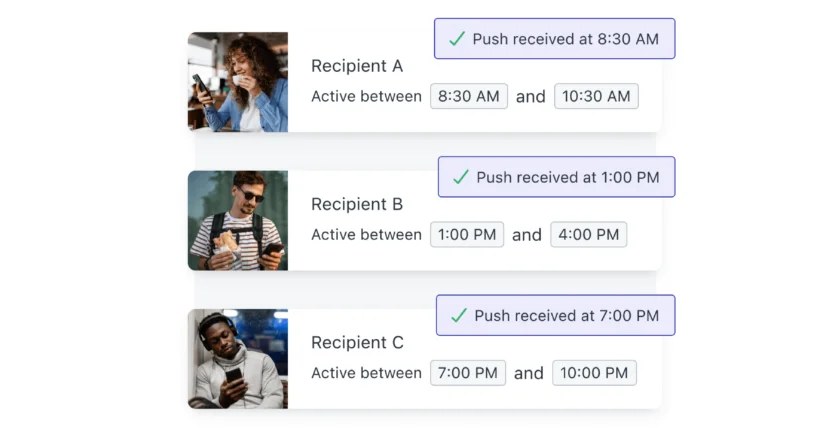
OneSignal is one of the toughest Iterable competitors because of its real-time analytics, advanced automation, and rich push notifications. With a well-documented SDK, setting up custom segments and in-app messaging is easy, using the sample code available. It integrates quickly and smoothly with iOS and Android apps, too.
The downside is that although OneSignal excels in automating efficient push notifications, it falls short in the cases of email and SMS. The platform lacks in-depth analytics in these two channels and is still catching up on message deliverability features.
Cost: You can get free access to journey workflows, unlimited mobile push notifications, and up to 10K monthly emails. OneSignal’s Growth plan starts at $9/month for up to 20K monthly emails. But to talk to a dedicated success manager and access your reporting history of more than 90 days ago, you need to upgrade to custom plans.
G2 Rating: 4.7/5
Channels: Push notifications, email, SMS, RCS, and in-app messaging.
Standout Feature: Detailed documentation and SDKs for fast setup with minimal code.
Why It’s Best for Automated Push Notifications: OneSignal’s clean and beginner-friendly UI makes it easy to set up push notifications with just a few clicks.
10. Best for geo-fencing capabilities: CleverTap
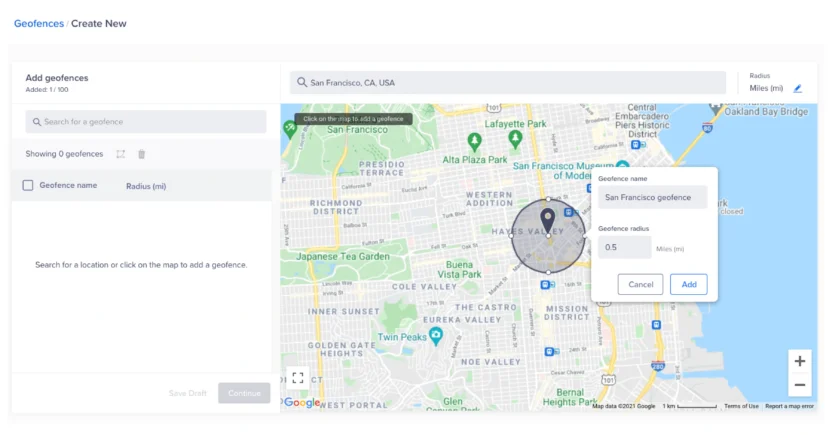
Heavily focused on mobile experiences, CleverTap excels in real-time experimentation and customer lifecycle optimization. Integrating it with your platform would be quick and simple — even more so with help from their support team.
Just like other Iterable competitors on this list, it helps you tailor channels for individual customer interests and preferences. So much so that it increases customer engagement by sending them location-based messages using exceptional geo-fencing. Its AI model, Clever.AI, even powers IntelliNODE to automatically orchestrate the most optimal journey variations after testing them.
However, a few users have remarked that sometimes, they need to depend on developers for configurations. For instance, you’d need to have features developed to include customer properties while importing customer data into the platform. So, if you’re not that tech-savvy or your dev team isn’t too supportive, using this platform can get a bit tricky with its steep learning curve.
Cost: Monthly pricing starts at $75 for up to 5K Monthly Active Users (MAUs). To increase the number of active contacts and access more advanced features of CleverTap, the pricing would increase. But you can access personalized reminders, automated promos, and a visual editor only as add-ons.
G2 Rating: 4.6/5
Channels: Email, push notifications, SMS, RCS, in-app messaging, web messaging, and WhatsApp
Standout Feature: TesseractDB™, a database for customer engagement and retention, that analyzes over 2K data points per customer every month to give you actionable behavioral insights for you to make hyper-personalized decisions.
Why It’s Best for Geo-fencing Capabilities: It uses Android and iOS Geofence SDKs to send customers relevant messages the moment they enter or exit a pre-defined area.
11. Best for email marketing automation: Intuit Mailchimp
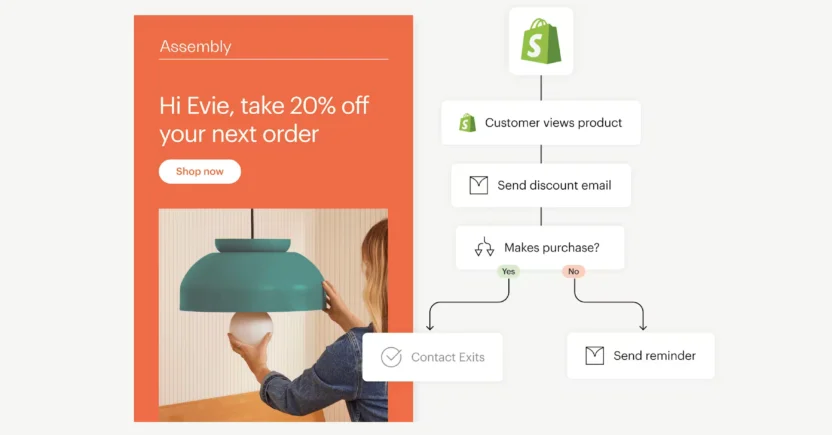
Mailchimp helps you easily create impactful automated email marketing campaigns. Its intuitive drag-and-drop editor makes building pre-designed email templates easy. Additionally, its email segmentation and personalization filters are powerful enough to enable sending the right email to the right person at the right time. Scheduling emails and reporting are fast and easy as well.
But some users have faced downtime during peak business hours. Their email templates are generally rigid, too, making it difficult for users to get creative with the templates without HTML knowledge. Others have reported how outdated the user interface is.
Cost: With a four-tier pricing plan, Mailchimp offers the basic plan for free. You can send up to 500 emails a day or 1K emails a month, to a maximum of 500 contacts. Sadly, your email support will stop after 30 days on the free plan, without access to features like A/B testing and behavioral targeting. Paid plans start at $8.86/month for 500 contacts, going up to $972.25/month for 200K contacts. Upgrading to one of the paid plans would be a good idea if you want a 50% discount for the first 12 months. SMS marketing is an add-on under paid plans, but only in the US and the UK.
G2 Rating: 4.3/5
Channels: Email, SMS (US or UK paid plans only), and MMS (only under US Standard and Premium plans for sending to US contacts)
Standout Feature: Role-based Access to grant different permission levels to different roles while managing campaigns.
Why It’s Best for Email Marketing Automation: Mailchimp offers over 50 behavioral triggers for deeper personalization to automate email marketing campaigns.
12. Best for plug-and-play templates: Insider One
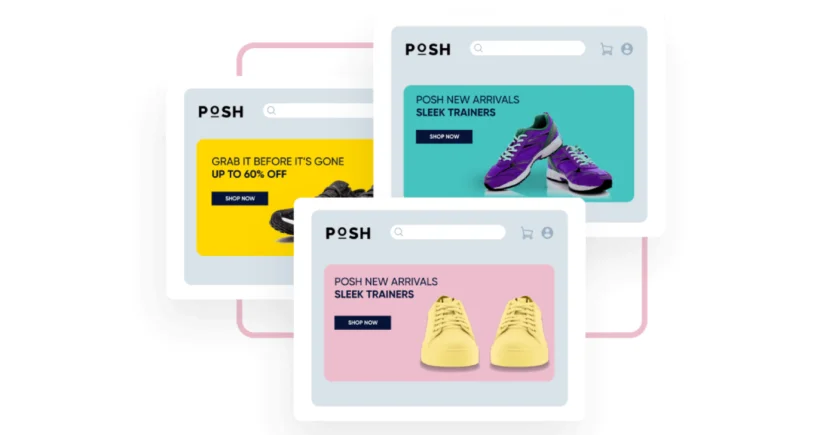
Among the formidable Iterable alternatives is Insider One, which helps brands aggregate their customer data and easily automate their marketing campaigns.
After aggregating the data, Insider One automatically builds 360-degree customer profiles based on their purchase history, journey metrics, lifecycle stage, and more. Then, it uses channel engagement, campaign history, Customer Lifecycle Value (CLV), and other factors to segment audiences.
An incredible support team points out solutions and shoots quick answers to users’ queries. But some of its users have called for its analytics reports to be more intuitive and advanced. If you’re unfamiliar with complex marketing automation concepts, you might find the learning curve steep, too.
Cost: Core features in Insider One’s Basic plan cost about $500/month, with more advanced features starting at $1,500/month.
G2 Rating: 4.8/5
Channels: Email, web and app push notifications, WhatsApp, SMS, social media ads, and website.
Standout Feature: Smart Product Recommender that highlights the most optimal product combinations, like recently viewed items and trending products.
Why It’s Best for Plug-and-Play Templates: Its simple drag-and-drop editor lets you customize its templates and get campaigns running in no time.
13. Best for email deliverability: Klaviyo
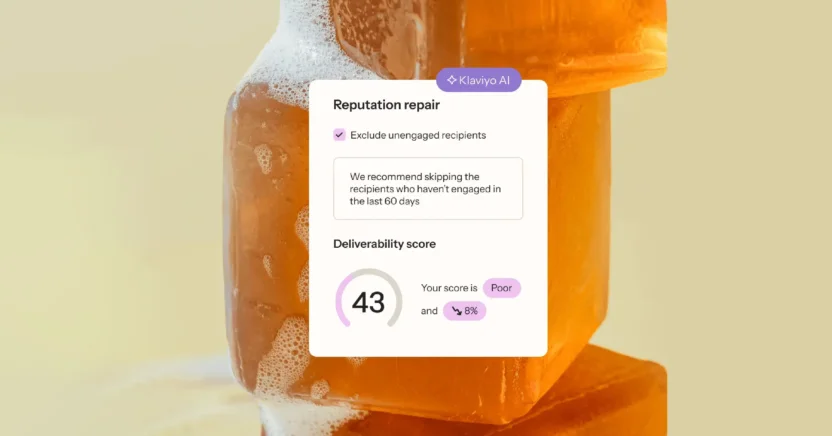
Klaviyo is a CRM platform built for B2C marketers. By combining marketing, customer service, and analytics on one platform, it helps you target the right audience with real-time personalization.
It also offers a data platform that unifies all your customer profiles and segments to give you one single view of the customer. Some customers have also praised the platform for its seamless integrations, the best being Shopify.
However, many users have raised concerns about Klaviyo’s rising prices. Apart from the significant price bump and hidden costs, they’ve noted that the maximum number of contacts and emails has also been limited.
Cost: Grows with the number of active contacts and your monthly SMS/MMS credits. You have to use a credit for each SMS/MMS you send. For example, you’d pay $135/month for sending 10K monthly SMS/MMS messages (equals 10K credits) and 15K emails to 1K-1.5K active contacts. Klaviyo also offers a free plan for sending 500 emails and 150 SMS/MMS messages every month to up to 250 active contacts. It treats marketing analytics and product reviews as add-ons, starting at $100 and $25 a month, respectively. For Klaviyo’s Advanced Data Platform, you have to cough up $500/month for 100K total contacts across all channels, including inactive ones.
G2 Rating: 4.6/5
Channels: Email, SMS, MMS, RCS, WhatsApp, in-app messaging, and mobile push notifications
Standout Feature: Time delays between actions in flows to optimize email campaign timings
Why It’s Best for Email Deliverability: Klaviyo AI automatically fixes your email sender reputation so your emails always land in customers’ inboxes, instead of spam folders.
14. Best for intuitive navigation: Braze
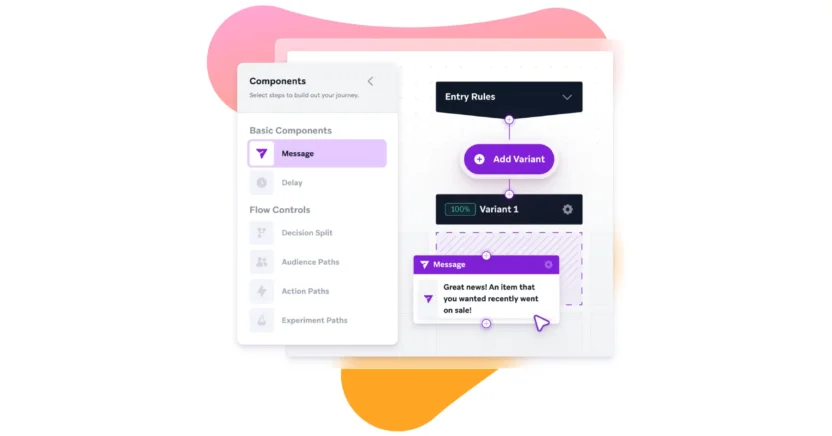
Braze’s powerful data platform and real-time customer signals make it one of the strongest Iterable alternatives. The platform lets you unify first-party data from different sources in real-time by integrating with your data warehouse and backend systems.
Because of its drag-and-drop features with no HTML experience required, detailed documentation, and a structured onboarding process, it’s also one of the easiest platforms to navigate.
With Braze, you can deliver tailored customer experiences across all online touchpoints, using intuitive segmentation and real-time journey orchestration. BrazeAI™ even powers intelligent optimizations to experiment with the best strategies for engaging with your customers.
However, you may face obstacles while integrating Braze with your existing systems, like some users have. Its initial setup is complicated, too, until you get the hang of it after gaining enough technical knowledge. If these challenges seem like deal-breakers to you, why not explore the top alternatives to Braze?
Cost: Braze’s monthly pricing starts at $1K, while its Enterprise plan, offering extensive integrations, more advanced features, and dedicated support, has custom pricing.
G2 Rating: 4.5/5
Channels: Email, SMS, RCS, mobile app, web, LINE, and WhatsApp
Standout Feature: Cost-based channel segmentation, allocating higher send volumes to cheaper channels first, and premium channels later.
Why It’s Best for Intuitive Navigation: Braze has an elegant and user-friendly interface.
15. Best for building easy automated workflows: Omnisend
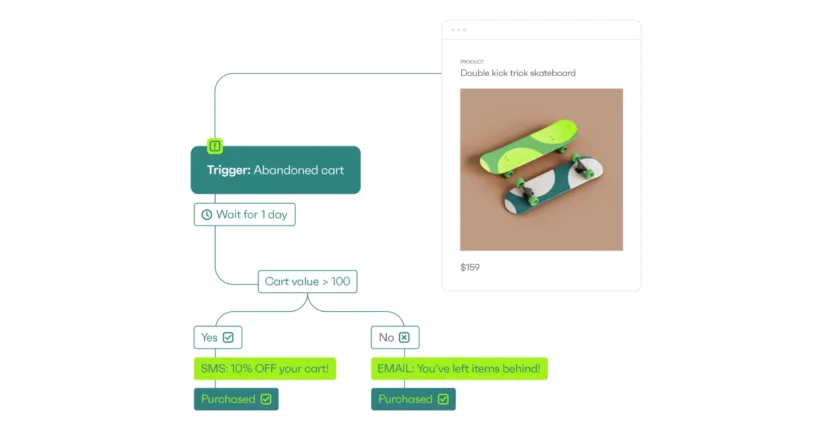
Using Omnisend, you can generate on-brand email copy, pre-headers, and subject lines in seconds. Meanwhile, Iterable’s Copy Assist helps you write only email subject lines and pre-headers — not email copy.
From segmenting customers based on their shopping behavior and other variables to collecting email and SMS opt-ins, the platform leaves little room for improvement.
However, you can’t use custom domains for landing pages. Omnisend’s email and SMS analytics reports don’t dig too deep into their performance, either. Hence, driving long-term strategies or answering complex business questions takes a back seat.
Cost: Grows with the number of contacts and platform features. Monthly pricing starts at $59 for up to 500 contacts, while sending messages to 100K contacts costs between $900 and $1,334 per month. To identify your best-performing campaigns in a single dashboard and compare email and SMS campaign performance, you need a Pro plan with custom pricing.
G2 Rating: 4.6/5
Channels: Email, SMS, MMS (for USA and Canada), Facebook Custom Audiences, and web push notifications
Standout Feature: One-click integration with Ecommerce platforms like Shopify and WooCommerce.
Why It’s Best for Easy Automated Workflows: Omnisend lets you select pre-built automation workflows from its Automations Library for every step of the customer journey. You can also build custom workflows from scratch using its drag-and-drop, codeless Automations Editor.
7 Key Criteria to Consider When Choosing an Iterable Competitor
While Iterable is a strong contender in the customer engagement and marketing automation space, its limitations in terms of pricing and industry-specific features mean it might not be the right match for all B2C brands. As a B2C lifecycle marketer, you need a platform that doesn’t just align with your current needs. It should match your future growth and ROI potential, too.
Keeping that in mind, let’s look at seven criteria to consider when evaluating Iterable competitors.
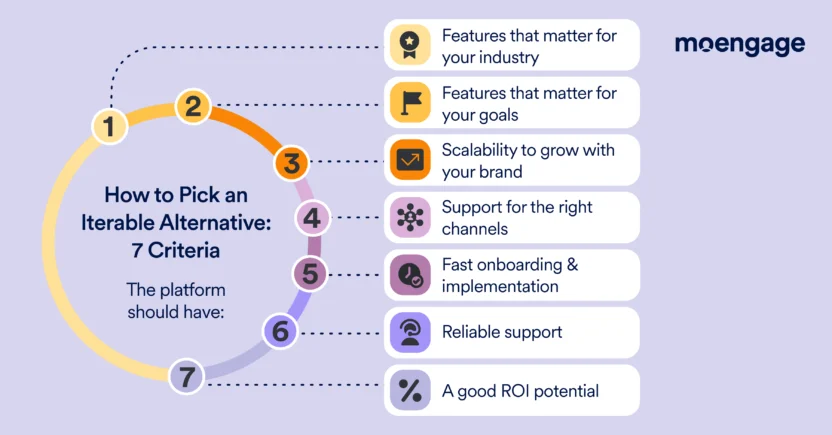
1. Does the platform have features specific to your industry?
Some marketing automation features of Iterable are versatile. But it may lack specialized capabilities that industries like fintech, retail, and travel demand.
For example, travel and retail brands might need to send brand-heavy or visually rich emails, which Iterable’s rigid email templates don’t always allow.
So, no matter which Iterable alternative you choose, it should work for your niche or industry.
Questions to ask yourself about this when looking for an Iterable alternative:
- Does Iterable’s competitor offer pre-built templates or workflows tailored to your industry? If not, are there any customizations or workarounds available?
- Can it handle the specific automated customer journeys and data your industry demands (such as loyalty programs or subscription renewals)?
- Does it provide analytics reports or dashboards that let you monitor and analyze customer engagement metrics unique to your niche?
- Does it follow compliance guidelines unique to your industry (e.g., Payment Card Industry Data Security Standard or PCI DSS for fintech, or Health Insurance Portability and Accountability Act or HIPAA for healthcare)?
- Does the platform cater to other brands in your sector?
2. Does it have features specific to your goals?
Need to launch marketing campaigns fast? Setting up campaigns on Iterable can be time-consuming. The platform might also occasionally get slow when you’re handling complex workflows or large datasets.
On the other hand, software like Iterable and Braze can help your brand with quick analytical insights. But if campaign analytics is your priority, such tools aren’t as robust and don’t offer as many customizable reporting options as platforms like MoEngage do.
Again, Iterable offers limited A/B testing capabilities within customer journeys. That’s not good enough if your goal is to gain insights into customer behavior along their journeys. In this case, you need a more advanced testing tool that you can directly implement in workflows to optimize your campaign performance.
Ultimately, your platform must help you meet your goals, whether you want to reduce customer churn, recover abandoned carts, or improve repeat purchase rates.
For example, if you prioritize lifetime value (LTV) growth, you’ll need robust capabilities for behavior-based segmentation and Recency, Frequency, and Monetary value (RFM) analysis. Something Iterable isn’t optimized for at a granular level.
Questions to ask yourself about this when looking for an Iterable alternative:
- What are your short-term goals (e.g., increasing email open rates and conversions)?
- What are your long-term goals (e.g., lead generation or nurturing customer loyalty)?
- Does Iterable’s competitor align with both your short-term and long-term goals?
- Does it support customer engagement strategies like AI-driven recommendations that align with your KPIs?
- Does it let you hone in on what works, using both A/B tests and multivariate tests?
- Can it provide deeper personalization or predictive analytics than Iterable?
3. Can the Iterable alternative scale with your brand?
Ever had a nightmare about being stuck with a platform that just can’t keep up five years down the road? For marketers, that’s a real fear.
Think about it: as your brand grows across more regions, channels, or customer segments, so should your marketing automation software. It’s not just about handling large customer bases. You’ll also need to adapt to changing market trends, support your expanding team, and integrate with new tools. And that’s just the beginning.
Some of Iterable’s customers have noted, as we’ve mentioned earlier, that the platform struggles to maintain performance under high demand. You can’t afford to migrate to one of its competitors, only to face the same problem with scalability.
Questions to ask yourself about this when looking for an Iterable alternative:
- How many customers can Iterable’s alternative solution handle without compromising performance?
- Can it easily integrate with new sales or analytics software as your tech stack evolves?
- Would it offer multi-regional support if you expand internationally?
- Is the platform’s customer service designed to handle larger brands?
4. Does it support the channels you need?
Not all Iterable competitors are all-in-one marketing automation solutions. Some platforms, like Pushwoosh, are focused on push notifications, while others, like Mailchimp, can only help you if email is the sole channel you need.
At its core, even Iterable supports email more than other channels. When it comes to SMS, for instance, the platform struggles to implement opt-in and unsubscribe processes, causing substantial revenue losses.
So, if a significant number of your customers prefer interacting with your brand through SMS, email, or web push notifications, why risk those gaps?
That’s why the platform you choose should strongly support the right channels for your brand’s goals and your customers’ preferences. Only then can you deliver seamless, personalized customer experiences.
Questions to ask yourself about this when looking for an Iterable alternative:
- Does Iterable’s alternative solution fully support omnichannel experiences? Or is it stronger in one or two channels more than it is in others?
- Does it offer flexible delivery optimization (e.g., the best time to send an email, or the most preferred channel)?
- Does it comply with data protection and privacy guidelines like the California Consumer Privacy Act (CCPA) and the General Data Protection Regulation (GDPR) for the European Union?
- Does it follow guidelines specific to the channel you need (e.g., Telephone Consumer Protection Act or TCPA rules for SMS or the Controlling the Assault of Non-Solicited Pornography And Marketing Act or CAN-SPAM for email)?
- Does it provide robust channel analytics reports?
5. How long would onboarding and implementation take?
One of the most common frustrations with switching marketing automation software platforms is the implementation process. While Iterable is quite straightforward to start with, larger teams may encounter unexpected roadblocks along the way.
For instance, some brands with more complex systems noted that they found Iterable’s team adding features and customizations during the onboarding process, and not before. The result? Delays that set back their campaigns by weeks. You don’t want to go down the same path with any Iterable alternatives.
Questions to ask yourself about this when looking for an Iterable alternative:
- What is the average time to take the implementation live?
- Would their team deliver what they promised and on time?
- How complex will API integrations be for your current stack? Can your onboarding team handle it?
- Does the vendor provide clear, extensive documentation or training materials to onboard your internal teams fast?
- Would there be a dedicated customer success manager for onboarding support?
- Can they coordinate with multiple other vendors your brand might be working with?
- How soon can your team start using the system after implementation?
6. Does the Iterable competitor have a reliable and responsive support team?
No matter how advanced the Iterable competitors are, technical issues or occasional hiccups are only normal. That’s when a reliable and responsive customer support team becomes crucial to help you run your marketing campaigns smoothly.
Iterable’s customer support team is responsive, no doubt. But the more technical an issue gets, the longer the gap between ticket response time and issue resolution. Such delays can become a big problem, especially for fast-moving B2C brands. They can’t afford downtime or missed campaign deadlines.
This is why you need a support team that understands how urgent the situation is. They should also be tech-savvy enough to solve your problems quickly.
Questions to ask yourself about this when looking for an Iterable alternative:
- What is the average ticket response time? Is it longer than Iterable’s?
- Is there a single point of contact for issues?
- What’s their procedure for handling critical issues?
- Can you contact their team through multiple support channels, like phone and email?
- Would you get specialized technical support for troubleshooting or complex integrations?
7. What’s the Total Cost of Ownership (TCO) and ROI potential?
Finally, don’t forget the price factor when evaluating Iterable’s competitors and alternatives.
Iterable charges for every user on their platform, whether they’re unsubscribed or unengaged. It also charges separate fees for channels like push notifications, in-app messaging, and web push. The bottom line? The platform’s exceedingly expensive! No wonder its pricing is a concern for small and mid-sized B2C brands.
Remember, platforms that require significant internal resources for maintenance may cost more in the long run. On the other hand, a platform with a higher Total Cost of Ownership (TCO) but a stronger ROI potential could be worth the investment.
Questions to ask yourself about this when looking for an Iterable alternative:
- How does the upfront cost of Iterable’s competitor compare to Iterable’s?
- Are there any additional costs for integrations, customizations, or support?
- Are there any likely cost savings through features like deeper personalization (e.g., lower churn or fewer bounced emails)?
- How fast can you expect ROI based on the platform’s capabilities?
Top 3 Iterable Alternatives Feature Comparison: How They Stack Up
The right customer engagement platform isn’t always the most popular one. It’s the one that supports your goals, needs, channels, and scale, all the while staying within your budget.
All things considered, we’ve narrowed down your choice to the top 3 Iterable competitors — MoEngage, Adobe Marketo Engage, and ActiveCampaign.
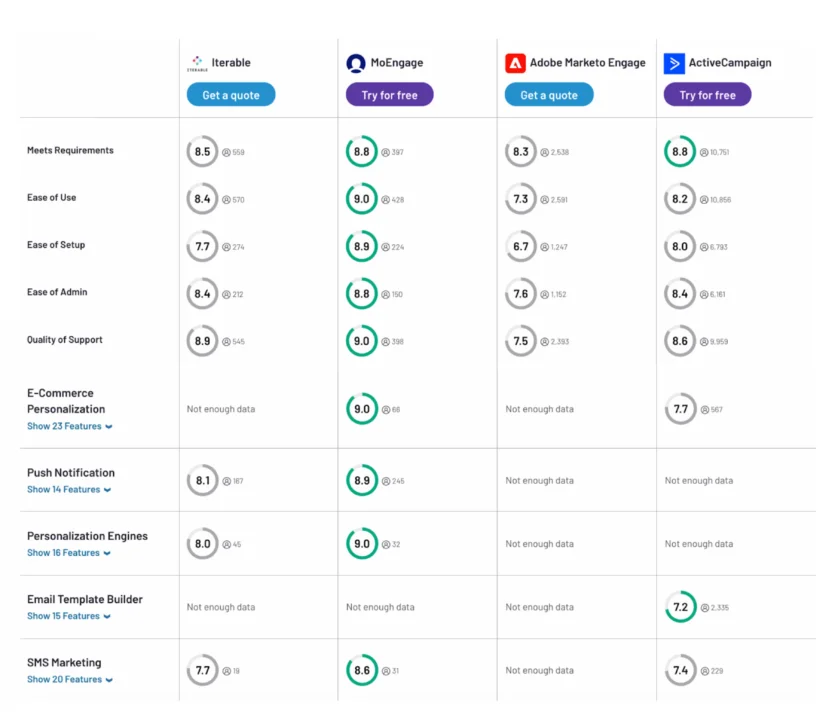
Now, let’s compare these Iterable competitors based on the most significant criteria.
| Criteria | Iterable | MoEngage | Adobe Marketo Engage | ActiveCampaign |
| G2 Rating | 4.4/5 | 4.5/5 | 4.1/5 | 4.5/5 |
| Omnichannel Capabilities | Email-first. Add-ons charged for push and other channels. | 11 channels natively supported (push, WhatsApp, SMS & RCS, in-app, ads, etc.) | SMS, email, mobile push, webinars, and social. Add-ons charged for mobile push, SMS, and webinars. | 4 channels natively supported (email, SMS, WhatsApp, and web). |
| AI Tools | Limited use. Predictive audiences available for premium pricing. | MoEngage’s AI built in for segmentation, personalization, and content generation and optimization. | Basic AI tools for ad targeting, but lacks predictive analytics or deeper personalization. | AI agents for basic workflows. |
| Reporting | Limited dashboards. Need tools like GA4 for detailed reports. | Custom dashboards with real-time campaign analytics and customer behavior data. | Needs workarounds for actionable insights. | Decent dashboards and basic dynamic monitoring of performance metrics. |
| Platform Stability | Slow for complex workflows. | Consistent uptime during high-traffic campaigns. | Reliable for enterprise-scale workflows, but initial setup can take time. | Stable platform, but may struggle with heavier automations or larger datasets. |
| Your Priority | Email-first campaigns or advanced segmentation. | AI-powered omnichannel automation and ease of use with enterprise scalability. | Strong CRM integrations. | Dynamic workflows for simple email, SMS, and WhatsApp campaigns. |
5 Migration Strategies When Switching to an Iterable Competitor
Switching to one of the Iterable alternatives can feel like you’re navigating uncharted waters. Whether you’re moving from Iterable or some other marketing automation or customer engagement platform, the migration process is crucial.
That’s because the migration and implementation are going to be the turning points of your relationship with the new platform. Here’s to a seamless, well-supported platform switch!
1. Create a step-by-step migration plan
Nobody likes surprises when a migration is already underway. Sometimes, Iterable’s clunky data exports or limited API documentation delay the process.
For a successful migration to one of Iterable’s competitors, you should specify timelines, phases, and responsibilities upfront. This means:
- Figuring out which data you need to migrate (user properties and attributes)
- Deciding how you’ll migrate the data (API-based integrations or CSV file uploads)
- Identifying inconsistencies or gaps in existing data (such as event naming conventions) before migration
When reviewing Iterable alternatives, ask your vendor for case studies or examples of successful migrations they’ve done in the past. Bonus points if those examples are relevant to your industry or use case!
For instance, Click Rain, a South Dakota-based digital agency, needed to migrate from a legacy platform to MoEngage. Not only did our team provide full transparency, but we also clarified all the steps and stages of the onboarding process. Due to the migration, Click Rain saved its client more than $18K annually.
Actionable Tip: Establish realistic timelines. Then, review those with both your team and your vendor. Create and share a Trello board or a migration checklist so both your team and your vendor’s team are on the same page.
2. Determine clear roles in your cross-functional migration team
Your marketing team isn’t the only team that’ll be involved in a migration to an Iterable competitor. You also need to rope in your:
- IT team for API integrations
- Data management team for event setup and migration
- Product team
- Security team for compliance
Involving all stakeholders early on during the process ensures the new platform meets their specific needs. It also helps you avoid roadblocks during implementation.
But if teams don’t coordinate, integrations might fail, and workflows might not work. Some Iterable users even report finding bugs during onboarding due to incomplete communication.
Actionable Tip: Make sure each person involved in the process understands their role and those of others. To keep everyone in the project aligned and on track, schedule weekly meetings until migration is complete.
3. Automate the migration process wherever possible
Manually importing customer profiles or segments wastes time today. For instance, moving templates is a hassle due to Iterable’s limited HTML exporting capabilities. It would also make you wait for a long time just to import or export high-volume CSV lists.
Because time is money, the best customer engagement platform migration strategy is to automate campaign setup and data transfers wherever you can.
Ask your new vendor if bulk CSV imports or API-based transfers are possible. Don’t forget to include campaign performance metrics, user event history, and other historical data.
Actionable Tip: Find out from your vendor if you can access a sandbox environment. That way, you won’t disrupt your active production environment while testing integrations or automation workflows.
4. Ensure ongoing support and thorough user training
Humans dislike change. That’s why many teams dread having to shift to new tools, workflows, and terminologies.
So, how do you ease that fear? By introducing them to a support team (like Iterable’s) that sometimes takes ages to respond?
Of course not. Start by conducting hands-on training sessions with your new vendor’s customer success team. Save any notes, documents, or videos your team can refer to after implementation. Post-launch support makes resolving issues after migration easier, so make sure it’s included in the migration agreement.
Iterable competitors, such as MoEngage, have dedicated implementation and customer success teams on standby. They can patiently walk your team through complex data imports and other tough setups before and after implementation. All through the process, you’ll receive hands-on migration support to help you transition from Iterable to MoEngage.
And if you want to customize your onboarding based on your team’s workflows, or schedule follow-ups post-launch for troubleshooting, all you have to do is ask!
A case in point is Drop, a card-linked rewards and offers app. To help Drop migrate to MoEngage without hassle, our Professional Services team offered end-to-end support. This included handing them well-documented SDKs and APIs, and fast query resolution. Believe it or not, the Drop app went live with MoEngage in just 7 days!
In fact, Nicholas Diluzio, Drop’s Growth Manager, said:
We found integration with MoEngage to be straightforward and were able to beat integration deadlines by weeks… We’ve had to transition from using a different service, and the process has been seamless.
Actionable Tip: Schedule weekly check-ins with the Iterable alternative for at least 4 to 6 weeks after launch. This will help iron out any technical issues or onboarding challenges that may pop up in the first few weeks post-migration.
5. Test and re-test
Waiting till launch day to find out if something is working or not? It’s a bad idea. The last thing you want to do is to find inconsistent customer data or glitches in workflows in your first campaign post-migration. That would be embarrassing. This is why you can’t treat testing as just a box to be checked off. Especially if you’ve experienced slow data loads or problems with scaling large workflows in Iterable.
Test everything, from workflows to data handling. Invite all your team members and other teams that will be using the new platform to test its features. It’s better to weed out bugs before and during migration than have them pester your customers.
MoEngage, for instance, allows you to preview campaigns in real-time while migrating them to the platform. This lets you spot what’s broken, right before launching.
Actionable Tip: Implement controlled rollout strategies. Don’t disable all your workflows on your old platform (like Iterable) at once. Wait till the new platform is fully operational and tested. Use small data samples first to test campaign delivery.
Top 5 FAQs Answered About Iterable Alternatives
When exploring Iterable competitors and alternatives, it’s common to feel overwhelmed. There are so many options and feature sets to take in!
That’s why we’ve answered the most pressing questions B2C lifecycle marketers ask while navigating the same process.
1. What are the main reasons B2C lifecycle marketers look for an Iterable competitor?
Marketers cite specific pain points that cause them to switch from Iterable to one of the top Iterable competitors. According to G2 reviews, these are the top issues Iterable users face:
- Limited analytics: Iterable doesn’t offer customizable dashboards or advanced campaign analytics natively, unless you integrate it with external tools like GA4.
- Heavily reliant on developers: Iterable users mention that its connectors and API integrations need heavy dev work. It’s frustrating for marketers who aren’t tech-savvy.
- Rigid pricing: Iterable charges for every contact in the system, making it expensive for larger databases.
- Mobile-centric limitations: Mobile-first brands struggle with interoperability for SDKs (like Flutter SDK).
- Workflow inefficiencies: Clunky UI and slow-loading workflows during peak campaign traffic annoy Iterable users.
2. How do customer engagement platforms like Iterable work?
Customer engagement platforms (CEPs) are tools that help you connect with your customers across multiple communication channels, including email, push notifications, SMS, and more.
Here’s how a CEP like Iterable and MoEngage works:
- The CEP integrates with your data warehouse or CRM to segment customers by purchase history, behavior, preferences, lifecycle stage, and more.
- B2C lifecycle marketers use the CEP’s drag-and-drop editor to create messages and set up campaigns.
- Automated campaign workflows are set up to trigger campaigns at particular times or in response to customers’ actions, like cart abandonment.
- The CEP generates reports to help you analyze the campaign performance metrics, like open rates, click rates, conversion rates, and unsubscribe rates.
3. What are the biggest factors that affect the price of Iterable competitor customer engagement software?
Pricing for CEPs that are Iterable alternatives varies widely, based on several factors like:
- Number of contacts: This is the main driver of software pricing. Iterable charges for all contacts, whether active or inactive, inflating the costs. But Iterable competitors like MoEngage charge based on Monthly Tracked Users (MTUs), i.e., users or contacts actively engaging with your campaigns.
- Features included: Advanced features like acquisition analytics and localization typically cost more. But MoEngage includes built-in AI functionalities like Merlin AI Copywriter at no additional cost.
- Setup requirements: The cost increases if Iterable’s alternative solution needs third-party tools, custom connectors, or developer intervention (as Iterable often requires). Some platforms also charge for onboarding support.
4. How should I price, compare, and shop for an Iterable alternative option effectively?
When choosing among Iterable alternatives, follow these steps to narrow down the best option:
- Define your priorities: Do you need an email-first tool, or should you expand into other channels like SMS? What’s your monthly budget?
- Compare features of different platforms: Evaluate Iterable competitors based on channels, cost, pricing, scalability, implementation, and ease of use.
- Check user reviews: Platforms like G2, Gartner, and Forrester Wave share independent reviews and can give you an idea of how satisfied the tool’s users are with the tool.
- Test the platform: Nothing helps you get a feel for how the platform works better than a sandbox environment.
5. Why do B2C marketers prefer MoEngage over Iterable or other Iterable alternatives?
Many marketing teams switch to MoEngage because it solves the issues they face with Iterable or Iterable alternatives:
- Omnichannel dominance: Whereas Iterable excels mainly in email and doesn’t shine for other channels, MoEngage handles 11+ channels seamlessly.
- Native advanced reporting capabilities: With MoEngage’s powerful custom dashboards, you don’t need to integrate extra reporting tools.
- Fair pricing: MoEngage is cost-effective, as it uses MTU-based pricing.
Final Thoughts on Choosing From Iterable Competitors
Whether you’re switching from Iterable or evaluating Iterable competitors, the process can seem tedious and time-consuming. Start by identifying your needs and goals, and testing different solutions.
Still need help finding tools that better suit your goals? Why not start with platforms like MoEngage, which offer omnichannel engagement and stronger analytics than Iterable? To kick it off, schedule a quick demo and learn how MoEngage outshines Iterable in customer engagement.


